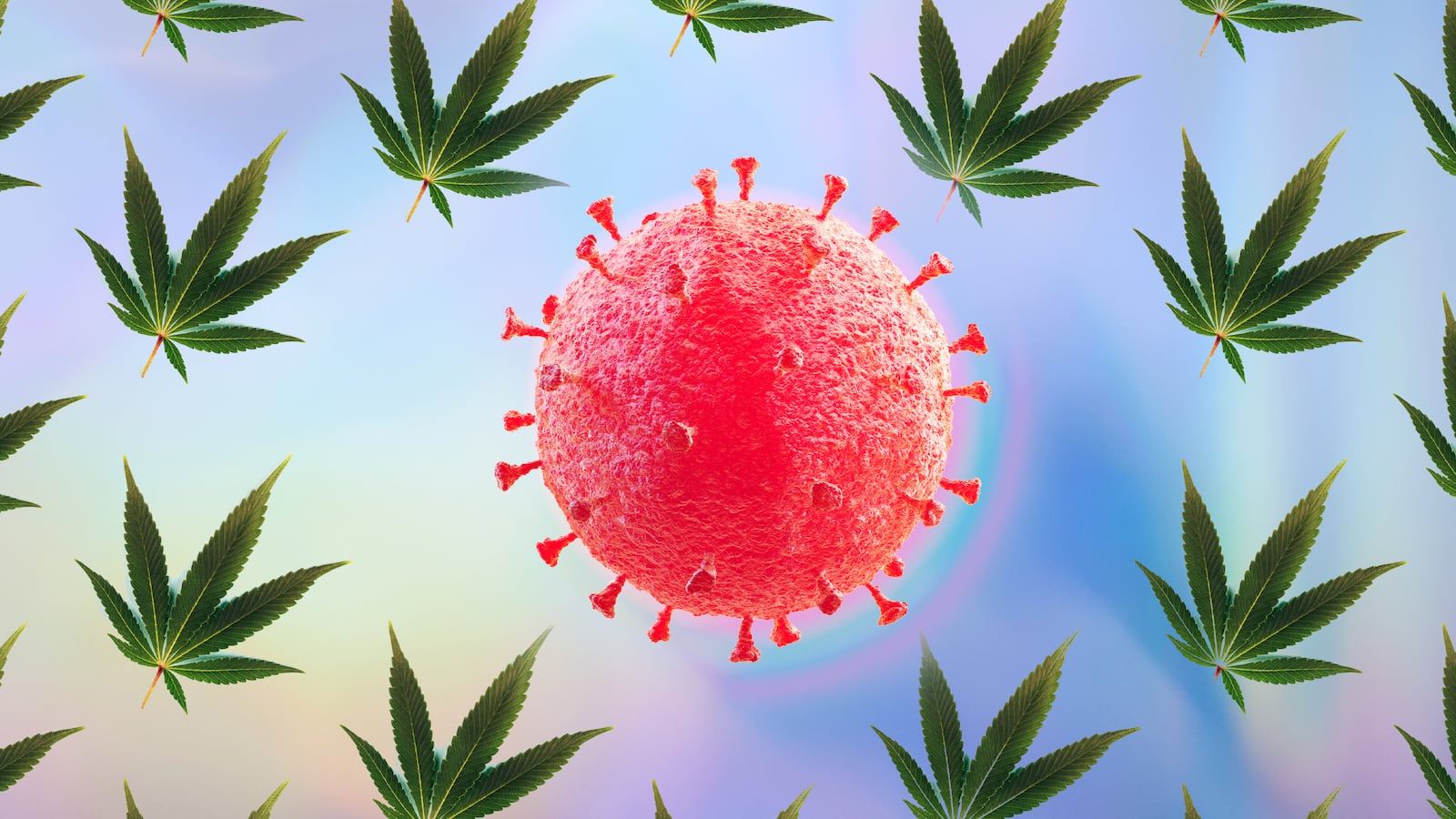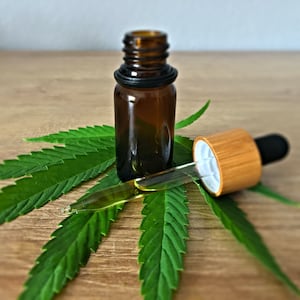Let’s get this out of the way now: You should not take CBD to prevent COVID-19. You should not smoke weed to prevent COVID-19—in fact, that will probably make things worse. You definitely should not drink CBD seltzers or take gummies to protect yourself from a virus that has the potential to kill you—especially when there are vaccines that are proven to protect you.
At the same time, it can also be true that CBD from cannabis has a role to play in this pandemic—from treating COVID directly, to dealing with the pandemic’s emotional side effects. We’re already seeing this potential teased out in a flourish of new scientific research.
Last week, scientists published findings suggesting CBD might stop the coronavirus from replicating inside cells. They also found that patients prescribed CBD-based drugs for epilepsy had lower COVID-19 positivity rates than people who hadn’t been prescribed CBD, an early signal that this could hold up in the real world. This was hot off the heels of another recent study suggesting two other cannabis compounds could bind to the coronavirus’ spike protein—stopping it from getting into cells in the first place.
“When COVID first started, there was a lot of interest in the potential for cannabidiol [to] treat COVID patients, at that time there was scant data to hang our hat on,” Ziva Cooper, the director of the UCLA Cannabis Research Initiative, told The Daily Beast. “Then here are two examples, both published within a week, that show maybe there is some promise.”
The bottom line for these two studies was the same: We need more clinical trials on CBD and COVID-19. The good news is that there are some trials already in the works. At the moment there are currently seven clinical trials registered with ClinicalTrials.gov that are investigating CBD in connection with COVID-19, and several more in progress elsewhere, The Daily Beast has learned.
Some studies have investigated the role of CBD in treating acute COVID-19 (that is, the period of time when you have symptoms). Others are investigating how CBD could treat the extant effects of COVID experienced well after the infection is already cleared out the body (also known as “long COVID”). Finally, a third vein of research is looking into whether CBD can help people grappling with the emotional burnout caused by the pandemic.
There’s still a lot we don’t know about what CBD can do for COVID, but its potential application keeps building with every new round of studies being published. We need to figure out what its role will be—perhaps sooner than we think.
Initial Infection
The idea that cannabis could help treat the effects of COVID-19 isn’t especially new. One early theory during the first days of the pandemic was that the anti-inflammatory effects of CBD (the common name for cannabidiol, a major non-psychoactive compound in cannabis), might reduce the impact of cytokine storms—intense immune system reactions that contribute to COVID-19’s life threatening symptoms.
“If CBD might be helpful for that, then essentially, it could perhaps prevent increased severity of disease and prevent the loss of life in certain situations,” said Cooper.

Ziva Cooper
Courtesy UCLAInspired by this idea, José Alexandre de Souza Crippa, a psychiatrist at Ribeirão Preto Medical School at the University of São Paulo, conducted a clinical trial on CBD and acute COVID infection during Brazil’s winter 2020 COVID-19 wave. Their study followed 91 patients with mild-to-moderate COVID 28 days. Half got CBD and half got a placebo. But the study found CBD had no real effect on the disease.
Crippa has kept following these patients for a year. Still, the results have not changed: “We had great expectations for the acute phase [trials] but we didn’t see that,” he told The Daily Beast.
That said, this line of inquiry is far from closed. Cooper points out that patients tolerated CBD well, which suggests it’s safe to keep these studies going. And, the patients in these studies got low doses of CBD.
“There is a window of opportunity here to go up and use a much higher dose of cannabidiol in that patient population to determine if it might have an effect on COVID symptomatology,” said Cooper.
CBD for the Long Haul
Undeterred, Crippa has pivoted to investigating CBD’s effects on long COVID—in which patients are debilitated for several months by symptoms like headaches, malaise, severe fatigue, difficulty concentrating, and shortness of breath. He’s conducting MRI scans on three groups: people treated with CBD and diagnosed with COVID from his earlier study; a placebo group who had COVID but didn’t get CBD; and a third group of people who have never tested positive for COVID.
Crippa’s rationale is that CBD could have some protective effects when it comes to anxiety and depression, common problems in long COVID patients. He’s also interested in whether CBD, which has shown neuroprotective effects in Parkinson’s patients, might alleviate brain fog associated with long COVID.
“We have already done studies in animals, and cannabidiol seems to have a neuroprotection and anti-cognitive deficit effect, which is a key problem in long COVID,” said Crippa. “So it’s reasonable to infer that cannabidiol might prevent this in the long-term.”
But, he cautioned that reasonable expectations don’t mean this idea will pan out. “It’s trial and error,” he said.

David Nutt.
Courtesy Imperial College LondonCrippa’s group isn’t the only one interested in what cannabis-based medicine could do for long COVID. Drug Science UK, a non-profit group led by Imperial College London neuropsychopharmacologist David Nutt, is in the early stages of a clinical trial that will give 30 long COVID patients access to a CBD-dominant formulation of medical cannabis called MediCabilis (a liquid product made by Bod Australia) and see how well they tolerate the drug from February through June.
The spotlight on this study is especially bright thanks to the participation of Nutt, widely-known as a longtime advocate for drug research who was dismissed from the U.K.’s Advisory Council for the Misuse of Drugs in 2009 for his opinion that MDMA is less dangerous than horseback riding and alcohol. (These days, MDMA is being researched as a "breakthrough drug" for PTSD).
David Badcock, the CEO of Drug Science UK, said the group is undertaking the study because long COVID patients experience symptoms like pain, anxiety, sleeplessness, and high blood pressure or heart rates—symptoms which are also seen in conditions managed with medical cannabis. (For instance, an earlier study run by the group found that after three months of medical cannabis access, 75 patients with anxiety, chronic pain, PTSD or MS saw increases in quality of life scores.)
“As there is no established medical treatment for the [long COVID] condition, we felt it was important to study every possible option for people who’ve become ill during the pandemic—including medical cannabis,” he told The Daily Beast.
All of this research is still in its early stages. Crippa is in the middle of analyzing his data, and the trial run by Drug Science UK is still only just to determine if it's safe for long COVID patients to take medical cannabis. If nothing goes wrong, Nutt and his team will scale up the study into a randomized controlled trial.
From Physical to Mental
Whether or not it turns out CBD can help us treat COVID symptoms, its biggest potential seems to be in helping us deal with the pandemic's psychological toll. Anxiety is one area where CBD has strong potential thanks to a “convergence” of pre-clinical evidence, Steven Laviolette, a professor in anatomy and cell biology at Western University in Canada, told The Daily Beast.
Laviolette has previously demonstrated that CBD can block the formation of fear-related memories in rats, because it interacts with serotonin signaling pathways in the brain. “Serotonin, of course, is really important for anxiety and mood disorders,” he told The Daily Beast. “Most of the major drugs that treat those disorders target the serotonin system, so it's very promising that CBD also seems to produce anti anxiety effects for the serotonin pathway.”

Steven Laviolette (left).
Courtesy Western UniversityRight now, there are at least two trials underway at the University of Texas at Austin looking to investigate the effects of CBD on emotional coping during the pandemic. But Crippa’s group has also already published work that showed how CBD helped burned-out hospital workers cope with stress.
During the acute COVID study in Brazil, Crippa also ran a study on 118 frontline health-care workers at Ribeirão Preto Medical School University Hospital. Half the patients took 300 mg of CBD alongside regular phone calls with a psychiatrist and motivational videos. The other group just got the phone call and video treatment.
Compared to the placebo group, the CBD group saw significant reductions in their emotional exhaustion, and anxiety scores. “After this one month, it was clear that the group that received cannabidiol did much better,” said Crippa.
Science Says...
On the other hand, new research is often an opportunity for people to push unproven ideas about cannabis onto the public. The U.S. Food and Drug Administration, for instance, has had to issue warning letters to CBD manufacturers who falsely claim that their products treat or protect against COVID.
Both Cooper and Crippa cautioned that the CBD most people buy at a store is almost definitely not the same stuff given to people in clinical trials, which must be manufactured according to FDA guidelines tested for purity and unknown substances. Scientists know exactly how much CBD is in every dose—something that’s not always true of over the counter CBD products.
In other words it’s not the same stuff you can buy at a dispensary, let alone a gas station.
While research into medical cannabis and CBD seems to have too much momentum to grind to a halt, snake oil salesmen can slow it down and create agonizing hurdles out of thin air. And there are already barriers that make this type of research hard enough.
“Given the socio-cultural history of candidates and then the reluctance among sort of the established psychiatric community to be more open minded towards cannabis based pharmacotherapies it’s been challenging,” said Laviolette. “We really need to have a stronger investment for research into this area, and less and less red tape as well.”
At the moment we still don’t know exactly what role, if any, CBD will play in dealing with COVID-19 or its emotional aftermath. But there’s certainly enough research to say it’s worth learning more.
“It seems like right now we’re pretty far from knowing precisely what we can hang our hat on,” Cooper said. “But, you know, this is how science operates. You get some hits, you get some signals. And then other studies are built off of that.”







